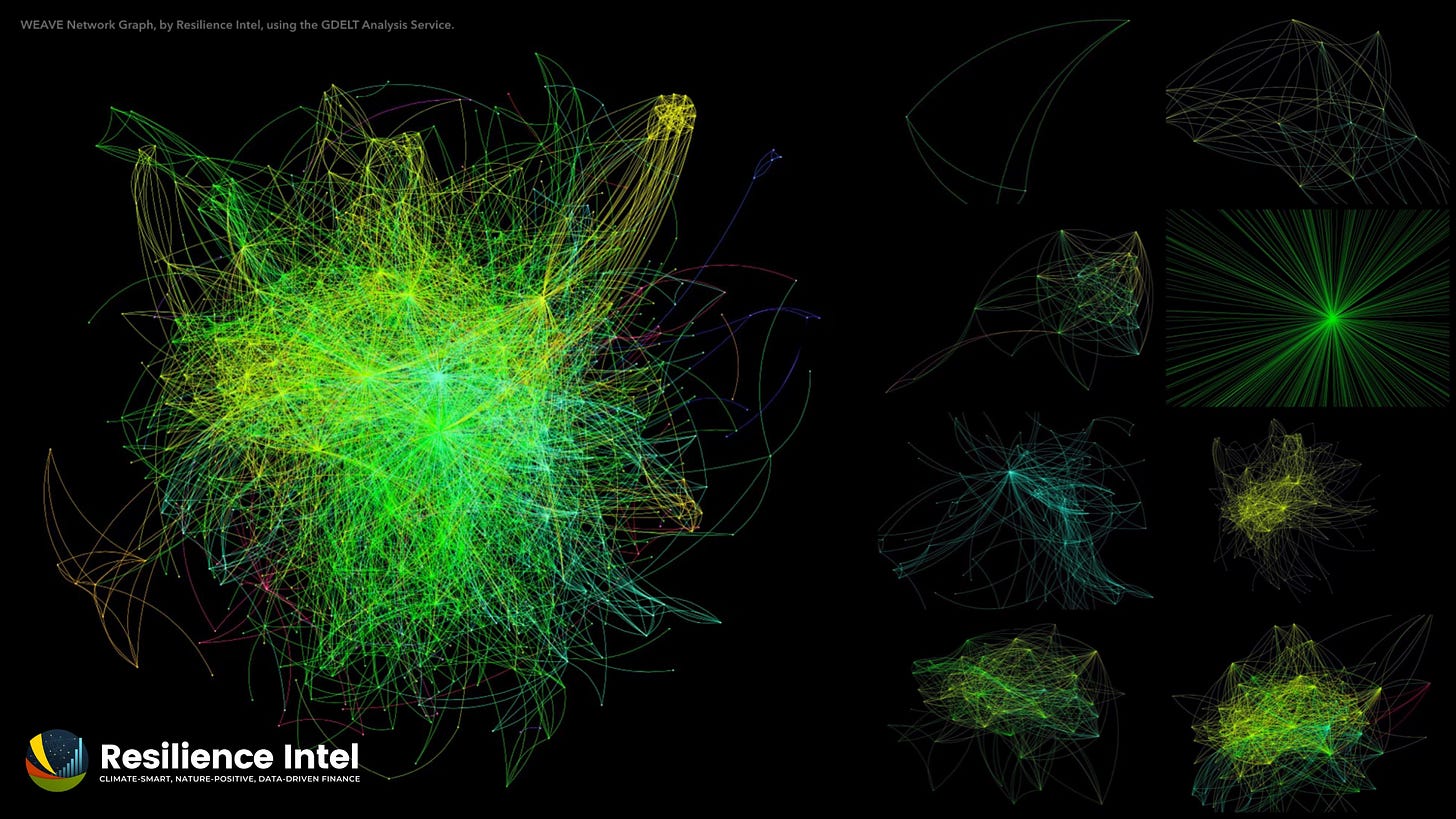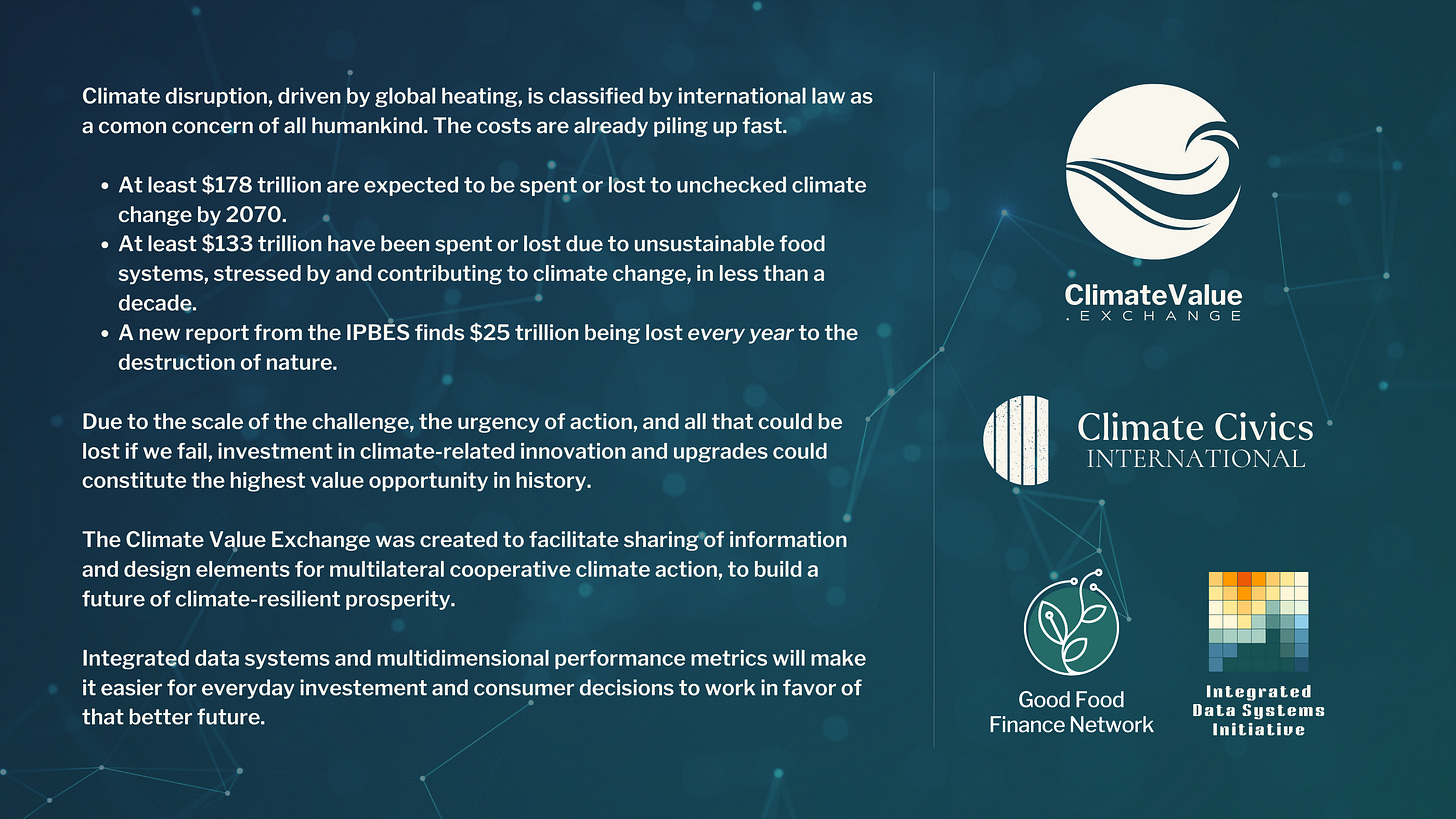Multidimensional value-creation insights are coming
MVC insights are re-shaping services that use applied Earth systems science, and making it easier to avoid hidden costs while building resilience and expanding opportunity.
Much ink and light has been spilled over the backlash against ESG (which is shorthand for standards and ratings that measure performance on environmental, social, and governance value-building). Political campaigns have been fought over the idea that somehow having access to this information limits our freedom. Of course, the opposite is true: The better the information we have, the more detailed and precise, the more informed we can be in making good choices.
The exercise and defense of freedom is made up of choices:
Better choices give us more freedom and opportunity;
Ill-informed choices incur sometimes hidden but preventable costs.

Whether we are talking about ESG or CSR, which abbreviates “corporate social responsibility”, the ultimate aim is to achieve a kind of multidimensional value-creation insight. Let’s call that MVC. MVC insights are much more than a wish-list of environmentalists and social do-gooders; MVC data reference non-financial factual information to understand the true value or true cost of a decision.
You might think you have made a good bet, because a particular stock rose by 8% over a 12-month period, but that 8% gain on one specific stock might have added 0.5% cost on average across nearly all other areas of economic activity, so that the sum of those hidden costs adds up to far more than the dollar value of your discrete win on that one stock.
Yes, that is possible, when you are talking about something as pervasive and far-reaching in economic impacts as energy, food, materials, or infrastructure.
When you consider that each actor throughout the value chain also has to respond to that 0.5% increase, you can see how such hidden costs will eventually hit you as a bigger, and possibly problematic price increase.
It is also the case that ESG standards, or MVC data systems, don’t just tell us about the uncounted pervasive value-creation impact of a given investment. They also can tell us with substantial lead time that a particular business or sector is simply not attuned to the emerging needs of the marketplace.
For instance, if homeowners insurance is impossible to get because of wildfire risk driven by climate disruption, then climate-disrupting businesses will be less marketable in that market.
By contrast, those that are making significant progress toward more climate-resilient business models will likely find favor in that marketplace, both among consumers and as insurers, banks, and public incentives respond to rising costs.

MVC systems are intended to let everyone else know whether a given company or industry is putting in the effort they, the consumers, want to see. If they are not, then everyone can get a clear picture of where the smart money will eventually move. The sooner you have this information, the better, because not only can we avoid putting money where it is more likely to be lost; we can also work together to establish a better future economy and reduce climate impacts by reducing climate disruption.
In October 2015, at the Annual Meetings of the World Bank and International Monetary Fund in Lima, Peru, then Christine Lagarde (then IMF Managing Director, now head of the European Central Bank) referenced the Nazca lines to talk about the importance of macrocritical resilience. The outline of the economy—its overall shape and size—determines what is possible; macrocritical forces create that outline, and set boundaries for human wellbeing, security, ingenuity, and opportunity.
She cited examples, including:
Climate change – costly impacts, ever more costly subsidies for fossil fuels, development setbacks driven by disasters, and related issues of fiscal stability and destabilization;
Innovative technology – the potential for vast expansion of human knowledge and capability, and the risks involved in uncontrolled spread of new technologies and manipulated information;
Migration – made worse by climate change, economic hardship, hunger, and conflict, and requiring major improvements to international and national laws and practices;
Demographic change – mass economic migration between regions, affecting cultural identity and job security for tens of millions, while some populations age and others get younger;
Empowering women – Lagarde noted that IMF research had confirmed that “Whether to mitigate the effects of shrinking work forces, or to create jobs by starting small or mid-sized enterprises, no country can afford to disregard the contributions women make to their economies [and] Closing the gender gap will be a global economic game-changer.”
The viability of government budgets can even be measured by how well the countries in question perform on these “non-economic” issues. These macrocritical drivers of overall wellbeing are not just social good indicators; they are economy-shaping forces.
I once asked a friend who manages high-value portfolios if he would use such information to build a more long-term resilient portfolio. He did not hesitate to say (paraphrasing):
If I had reliable information that told me that a company’s practices are not sustainable, and they will lose favor in the market over time, I would absolutely use that information and act on it. What we need is detail, sources we can trust, and a clear pattern of usefulness over time.
The effort to develop multidimensional metrics that connect Earth systems insights to financial performance data will eventually lead to a generalized Resilience Value metric. Such insights will change the calculus for investors in the public, private, and multilateral sectors; beyond that, money itself will function differently, as whole economies self-organize to produce enduring value more reliably and to reward more people for doing so.
Those companies that delay—whether for political reasons or because they just aren’t sure where to start—will find themselves at a disadvantage, when high-value resilience insights become mainstream. Knowledge is power, and multidimensional value-creation (MVC) insights constitute real-world knowledge—not founded on the hope that financial earnings cause no harm, but on the evidence of which do and which do not.
Good Food Finance Network hosts Data Systems Integration Forum
On Wednesday, March 26, 2025, the Good Food Finance Network, together with Climate Civics International and the Climate Value Exchange, will hold Part 1 of a multi-session Data Systems Integration Forum.
This virtual discussion forum will focus on work needed to activate insights from the Good Food Finance Blueprint for Data Systems Integration, released last year. Visit the event page for more information or to register.
RELATED










